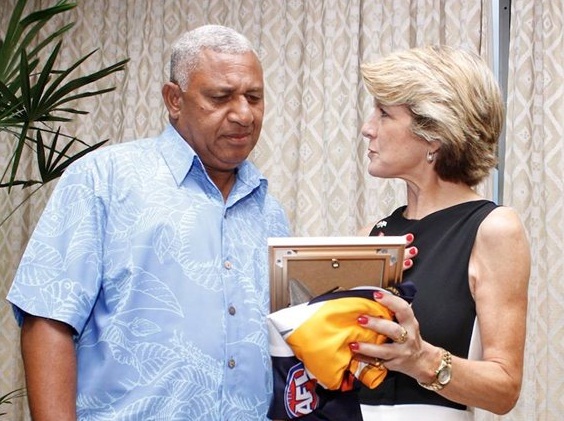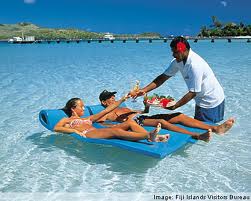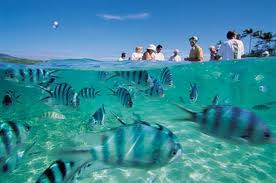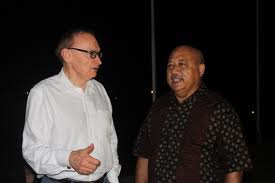 |
| (L)Fiji Prime Minister, Voreqe Bainimarama and (R)Australian Foreign Minister, Julie Bishop. [Image MoI] |
The Valentine’s Day meeting in Suva between Australia’s Foreign Minister Julie Bishop and Fiji’s Prime Minister, Commodore Voreqe Bainimarama proved more of a love-in than a confrontation. Predictions before the meeting suggested that confrontation—at least of interests if not personalities—was the more likely. On the day of the meeting the Lowy Institute predicted it would be Fiji’s last chance, while the Fiji Sun asserted with equal conviction that it was Australia’s last opportunity.
Reports from Suva suggest that the warmth between the two was more than just theatre for the media cameras. Just where relations go from here will decide how well grounded the rapprochement between the two countries really is.
Perhaps the first point to be made is that virtually all the coverage of the meeting focused on its bilateral significance—with complete justification. Ms Bishop was in Suva as a member of the Pacific Islands Forum’s Ministerial Contact Group on a monitoring visit to review Fiji’s progress toward retuning to parliamentary democracy. However, the significance was always going to be on the quality of the bilateral chemistry between the Fijian Prime Minister and the Australian Foreign Minister.
Fiji’s relationship with the Pacific Islands Forum won’t necessarily be repaired by the bilateral re-engagement, nor will Australia’s role in the regional body return to pre-sanction levels. Prime Minister Bainimarama is currently building a headquarters for a new regional body that excludes Australia and is intended to parallel the PIF.
The regional roles for Fiji and Australia have been forced apart by Fiji’s suspension from the PIF orchestrated by Canberra. Reconvergence is not impossible but it’s unlikely to be fully achieved any time soon. Regional affairs will remain a separate and significant issue for Australia.
The key development from the visit was in opening the door to improved bilateral links. But, while the roses have been accepted, what will it take to ensure there is a second date? Fiji has maintained that nothing matters unless the debilitating affects of the travel sanctions are lifted to enable strengthening of the economy and recruiting appropriate expertise for governance and the public sector.
Ms Bishop has undertaken to continue the review of the travel bans and take this to Cabinet for approval. Subtly this gives Australia time to await further validation of Prime Minister Bainimarama’s commitment to elections by the end of September 2014.
Richard Herr
" Fiji’s relationship with the Pacific Islands Forum won’t necessarily be repaired by the bilateral re-engagement, nor will Australia’s role in the regional body return to pre-sanction levels [...]Fiji has maintained that nothing matters unless the debilitating affects of the travel sanctions are lifted to enable strengthening of the economy and recruiting appropriate expertise for governance and the public sector. "
A significant watershed occurs at the end of February when Commander
Bainimarama hangs up his uniform and becomes simply civilian Prime
Minister Bainimarama. Not only will Prime Minister Bainimarama will no
longer be military commander, the new constitution guarantees that his
replacement as Commander will not be in Government either. Thus, this is
a very important political act that will break the direct link between
the Government of Fiji and the chain of command of the Republic of Fiji
Military Forces that has existed since the 2006 coup. This critical step
toward a civilianised Government prior to the September elections will
be accompanied on March 1st with the long awaited details of the Prime
Minister’s newly formed political party." Fiji’s relationship with the Pacific Islands Forum won’t necessarily be repaired by the bilateral re-engagement, nor will Australia’s role in the regional body return to pre-sanction levels [...]Fiji has maintained that nothing matters unless the debilitating affects of the travel sanctions are lifted to enable strengthening of the economy and recruiting appropriate expertise for governance and the public sector. "
With those moves toward a civilian and democratic Government continuing in Fiji, Ms Bishop brought to the meet more than just a spray of fresh roses. Guns were on the table as well. The reestablishment of defence attaché arrangements is an essential opening for other proposed developments, which are said to be readmission to the Pacific patrol boat program and a defence co-operation program.
Some of these proposals may be welcomed but sober reflection has already set in Suva regarding the renewal of defence ties. Fiji is said to have already renovated or arranged for the renovation of its current patrol boats and is aware that there are no budgetary provisions for new patrol boats, so any further vessels would be years away. Joint exercises and the restoration staff college training will be welcome but inclusion in broader high level arrangements such as the South Pacific Defence Ministers meeting will also have to be on the cards.
It’s in Australia’s interest to be able to work at the highest policy level with the RFMF on the panoply of regional security issues, including marine resource protection, border protection, and non-state transnational threats.
The Republic of Fiji Military Forces recently announced an expansion of its engineer corps by one battalion to cope with higher demand at home with rural development infrastructure as well its overseas commitments. Assistance with equipment and materiel for this expansion will be timely.
Critics might object to the restoration of the defence relationship with Fiji but there’s no chance that other areas of re-engagement will be ignored in favour of the defence cooperation. Nevertheless, Ms Bishop sensibly took the guns as well as the roses on the first date, recognising the importance of an effective relationship with RFMF to assist with a stable transition back to democracy.
It may well prove to be a key to a second date and a third.
Richard Herr is the adjunct professor of Pacific Governance and Diplomacy at the University of Fiji where he is also the honorary director of the Centre for International and Regional Affairs.
Editor’s note: the ninth paragraph of this post is an expanded version of the original posting.
Related SiFM post- The Last Foreign Policy Bender










